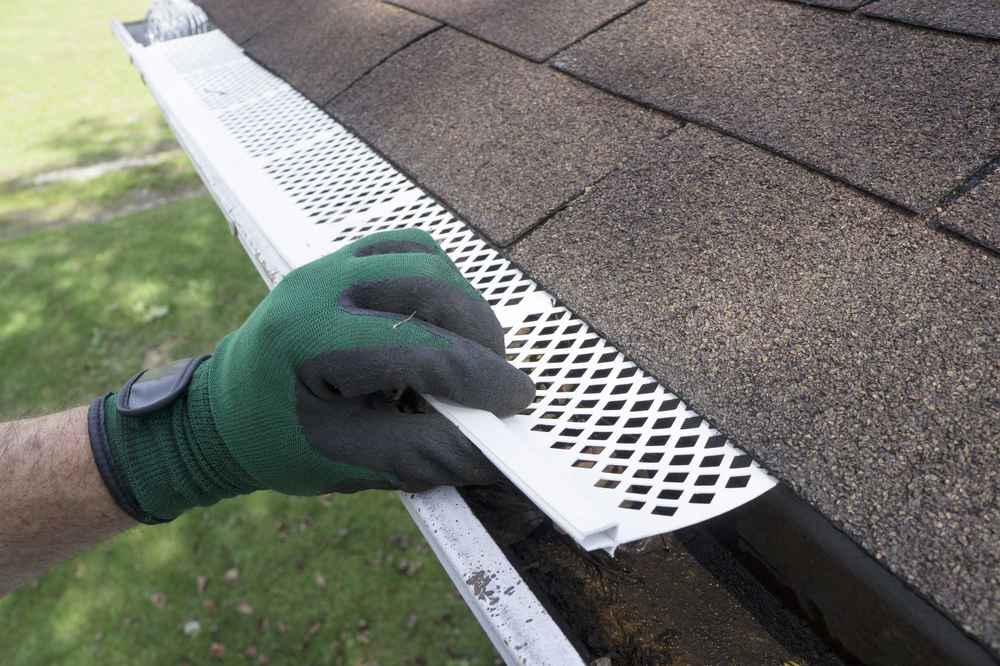If you’re tired of cleaning out soggy leaves, pine needles, and roof grit from your gutters, you’re not alone. Gutter maintenance is one of the most dreaded (and dangerous) chores for homeowners. Thankfully, there’s a smarter solution. This gutter guard guide will walk you through everything you need to know about choosing the right gutter protection system for your home.
From understanding how gutter guards work to comparing popular materials and designs, we’ve got you covered. By the end of this guide, you’ll know what kind of leaf guard system fits your needs and how to take the next step toward clog-free, low-maintenance gutters.
What Are Gutter Guards and How Do They Work?
Gutter guards, also called gutter covers, leaf guards, or gutter protection systems, are installed over your existing gutters to prevent debris from entering while still allowing rainwater to pass through. The purpose is simple: to limit the need for frequent cleaning while protecting your home from water damage caused by clogged gutters.
Here’s a breakdown of how gutter guards work:
- Debris is blocked or diverted before it can enter your gutter system.
- Rainwater flows through openings, holes, or mesh into the gutter channel.
- Water is then carried away through the downspouts just as it would with unprotected gutters.
A well-installed leaf guard system prevents overflow, reduces the chance of ice dams, and protects your foundation from water runoff, all while minimizing your time on a ladder.
Types of Gutter Guards: Pros and Cons
There are many gutter guard types available today, and each has unique benefits (and drawbacks) depending on your environment, roofline, and tree coverage. Let’s explore the most common options.
Bottle Brush Guards
These guards look like long pipe cleaners that sit inside your gutters. Water flows through the bristles, but leaves and twigs are supposed to stay on top.
Pros:
- Inexpensive and easy to install
- No impact on your roof
Cons:
- Quickly clog with small debris
- Difficult to clean
- Not long-lasting
Foam Gutter Guards
Foam inserts fit directly into your gutters and block large debris while allowing water to seep through the foam.
Pros:
- Budget-friendly
- Simple DIY installation
Cons:
- Trap moisture and plant matter
- Can break down or grow mold
- Require frequent replacement
Vinyl and Plastic Snap-On Guards
These guards clip onto your gutter system and act like a cover with holes or slots to allow water in.
Pros:
- DIY-friendly
- Better than foam or brush for blocking debris
Cons:
- Prone to warping and cracking in extreme temperatures
- Can interfere with roof or siding work
- Shorter lifespan
Perforated Aluminum Guards
Perforated guards are installed directly over the gutter and made of rust-resistant aluminum. They let rainwater in through small holes while keeping most leaves and debris out.
Pros:
- Durable and rust-proof
- Can last decades with minimal maintenance
- Blends in well with gutter systems
Cons:
- Some small debris may still enter
- Typically requires professional installation
Reverse-Curve Gutter Guards
These systems cover the top of the gutter and use curved metal to guide water into a small opening while debris slides off the edge.
Pros:
- Excellent for shedding large debris
- Long-lasting if installed correctly
Cons:
- May struggle with fast-flowing water
- Can be visible from the ground
- Risk of roof damage with improper installation
Micro-Mesh Gutter Guards
The gold standard in best gutter protection, these fine stainless steel or aluminum mesh guards filter out even the smallest particles, including pine needles and roof grit.
Pros:
- Filters all debris types
- Invisible from the ground
- Excellent performance in wooded areas
Cons:
- Higher upfront cost
- Must be installed professionally
- Still requires occasional blow-off cleaning
What Is the Best Gutter Protection System?
When it comes to choosing the best gutter protection, it really depends on your home’s specific needs. If you have minimal tree coverage and want a quick DIY solution, plastic or foam guards may do the trick temporarily. But for long-term performance, micro-mesh and perforated metal systems are hard to beat.
Key Factors to Consider When Choosing a Gutter Guard
If you’re comparing options, here are some important things to keep in mind as you follow this gutter guard guide.
Material
Stainless steel and aluminum offer superior durability and weather resistance. Vinyl and plastic are cheaper but won’t last as long, especially in harsh climates.
Debris Type
Do you have pine needles, heavy leaves, or roof shingle grit? Choose a guard that’s fine enough to filter your most common debris type.
Roof Slope and Water Flow
Steep roofs and heavy rain need guards that handle fast-moving water. Micro-mesh and reverse-curve options are ideal for these conditions.
Installation
Some guards are DIY-friendly, but premium systems should always be installed by a pro to avoid voiding your roof warranty or damaging fascia boards.
Visibility
If aesthetics matter, micro-mesh and in-gutter systems are often invisible from the ground.
Why Gutter Guards Matter for Homeowners
Gutter guards aren’t just about saving time; they help prevent real damage to your home. Clogged gutters can lead to:
- Roof leaks and rot
- Foundation damage
- Landscape erosion
- Mold and mildew around the fascia
- Ice dams in winter
A quality leaf guard system prevents these issues while extending the life of your gutters and roof. When installed correctly, gutter guards pay for themselves in maintenance savings and long-term home protection.
Schedule Your Free Estimate Today
Now that you’ve read this gutter guard guide, it’s time to take the next step. Whether you’re looking for low-maintenance gutters or the best gutter protection for a tree-heavy yard, Mile High Roofing Services is here to help.
Our team will walk you through all the gutter guard types, inspect your current system, and recommend the right solution based on your home, your trees, and your budget.
Schedule your free estimate today and let us help you install the perfect leaf guard system for your home.
 (720) 999-8282
(720) 999-8282




